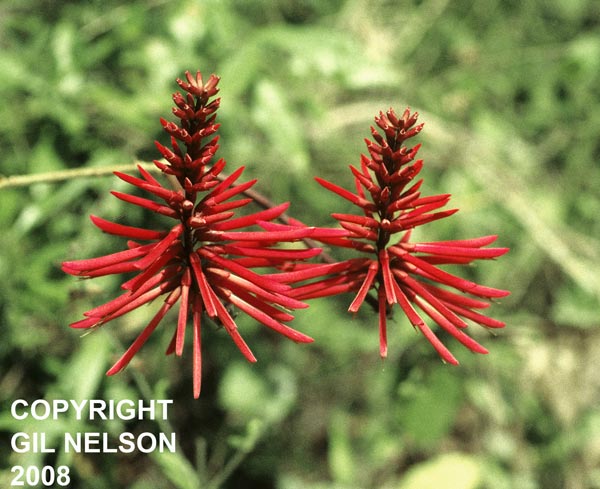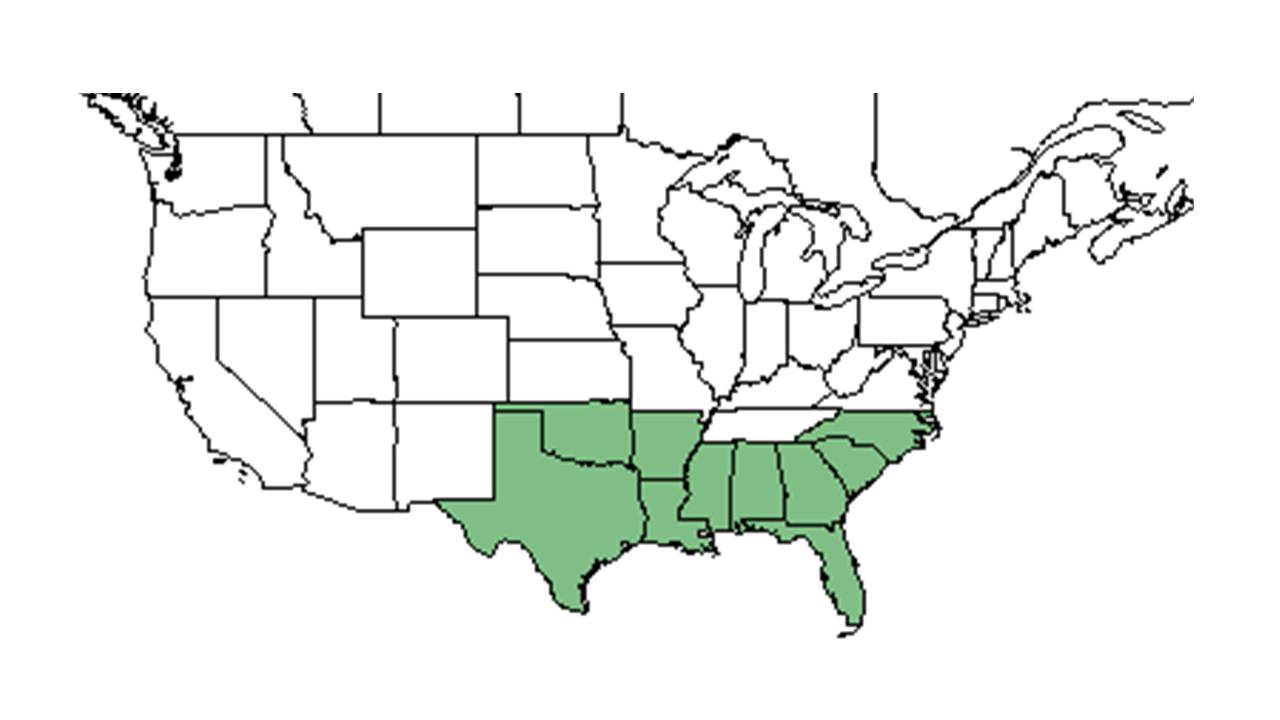Difference between revisions of "Erythrina herbacea"
KatieMccoy (talk | contribs) |
|||
| Line 27: | Line 27: | ||
===Habitat=== <!--Natural communities, human disturbed habitats, topography, hydrology, soils, light, fire regime requirements for removal of competition, etc.--> | ===Habitat=== <!--Natural communities, human disturbed habitats, topography, hydrology, soils, light, fire regime requirements for removal of competition, etc.--> | ||
Is found in sand pine woodlands, sandy hills, along edges of sinkholes, live oak-cabbage palm forests, uplands, hammocks, flatwoods, sand pine scrub, pine-palmetto scrub near ocean, Longleaf pine-wiregrass savannas, shaded slopes of river bluffs, and in calcareous open prairies (FSU Herbarium). Is also found in human disturbed areas such as along roadsides, in understory of recently clear cut pine woodlands, and edges of woodlands (FSU Herbarium). Can thrive in areas that are shady, semi-shady, or open (FSU Herbarium). Is associated with areas that have sand soil types, sandy loam, loam, thin loamy sand, and calcareous soil types (FSU Herbarium). | Is found in sand pine woodlands, sandy hills, along edges of sinkholes, live oak-cabbage palm forests, uplands, hammocks, flatwoods, sand pine scrub, pine-palmetto scrub near ocean, Longleaf pine-wiregrass savannas, shaded slopes of river bluffs, and in calcareous open prairies (FSU Herbarium). Is also found in human disturbed areas such as along roadsides, in understory of recently clear cut pine woodlands, and edges of woodlands (FSU Herbarium). Can thrive in areas that are shady, semi-shady, or open (FSU Herbarium). Is associated with areas that have sand soil types, sandy loam, loam, thin loamy sand, and calcareous soil types (FSU Herbarium). | ||
| + | |||
| + | Associated species include ''Quercus geminata, Q. chapmanil, Q. incana,Osmanthus megacarpus, Ilex ambigua, Vitis rotundifolia, Serenoa repens, Persea, Myrica, Carya glabra'' var. ''megacarpa, Pinus palutris, Baccharis halimifolia, Rhus copalina, Callicarpa americana, Diospyros virginiana, Morus'' (FSU Herbarium). | ||
===Phenology=== <!--Timing off flowering, fruiting, seed dispersal, and environmental triggers. Cite PanFlora website if appropriate: http://www.gilnelson.com/PanFlora/ --> | ===Phenology=== <!--Timing off flowering, fruiting, seed dispersal, and environmental triggers. Cite PanFlora website if appropriate: http://www.gilnelson.com/PanFlora/ --> | ||
Revision as of 13:31, 22 October 2015
| Erythrina herbacea | |
|---|---|

| |
| Photo taken by Gil Nelson | |
| Scientific classification | |
| Kingdom: | Plantae |
| Division: | Magnoliophyta - Flowering plants |
| Class: | Magnoliopsida – Dicotyledons |
| Order: | Fabales |
| Family: | Fabaceae ⁄ Leguminosae |
| Genus: | Erythrina |
| Species: | E. herbacea |
| Binomial name | |
| Erythrina herbacea L. | |

| |
| Natural range of Erythrina herbacea from USDA NRCS Plants Database. | |
Common names: Redcardinal, Coral bean, Cherokee bean
Contents
Taxonomic notes
Description
Distribution
Ecology
Habitat
Is found in sand pine woodlands, sandy hills, along edges of sinkholes, live oak-cabbage palm forests, uplands, hammocks, flatwoods, sand pine scrub, pine-palmetto scrub near ocean, Longleaf pine-wiregrass savannas, shaded slopes of river bluffs, and in calcareous open prairies (FSU Herbarium). Is also found in human disturbed areas such as along roadsides, in understory of recently clear cut pine woodlands, and edges of woodlands (FSU Herbarium). Can thrive in areas that are shady, semi-shady, or open (FSU Herbarium). Is associated with areas that have sand soil types, sandy loam, loam, thin loamy sand, and calcareous soil types (FSU Herbarium).
Associated species include Quercus geminata, Q. chapmanil, Q. incana,Osmanthus megacarpus, Ilex ambigua, Vitis rotundifolia, Serenoa repens, Persea, Myrica, Carya glabra var. megacarpa, Pinus palutris, Baccharis halimifolia, Rhus copalina, Callicarpa americana, Diospyros virginiana, Morus (FSU Herbarium).
Phenology
Has been observed flowering from February to June and fruiting from April to August (FSU Herbarium).
Seed dispersal
Seed bank and germination
Fire ecology
Is associated with annually burned pinelands (FSU Herbarium).
Pollination
Use by animals
Diseases and parasites
Conservation and Management
Cultivation and restoration
Photo Gallery
References and notes
Florida State University Robert K. Godfrey Herbarium database. URL: http://herbarium.bio.fsu.edu. Last accessed: June 2014. Collectors: D. B. Ward, G. Crosby, R. Kral, George R. Cooley, Carroll E. Wood, Jr., Kenneth A. Wilson, R.K. Godfrey, Grady W. Reinert, James D. Ray, Jr., C. E. Smith, Olga Lakela, Jackie Patman, Richard J. Eaton, Richard S. Mitchell, Tom Barnes, C. Jackson, A. F. Clewell, Loran C. Anderson, Gary R. Knight, K. Craddock Burks, S. W. Leonard, Elbert L. Little, Jr., Robert J Lemaire, Jack P. Davis, Rodie White, Wilson Baker, R. Komarek, Lisa Keppner, Annie Schmidt, Travis MacClendon, Karen MacClendon, Tim Clemons, R. L. Wilbur, C. Ritchie Bell, Samuel B. Jones, Nancy Coile, et al., Roomie Wilson, Clarke Hudson, Sidney McDaniel, and A Traverse. States and Counties: Florida: Brevard, Calhoun, Citrus, Collier, Dade, Flagler, Franklin, Gadsden, Gulf, Hardee, Indian River, Jackson, Leon, Liberty, Marion, Okaloosa, Pasco, Pinellas, St Lucie, Suwannee, Wakulla, Walton, and Washington. Georgia: Grady and McIntosh. Louisiana: Hammond. Mississippi: Adams, Jasper, and Kemper. South Carolina: Berkeley and Horry. Texas: Harris.